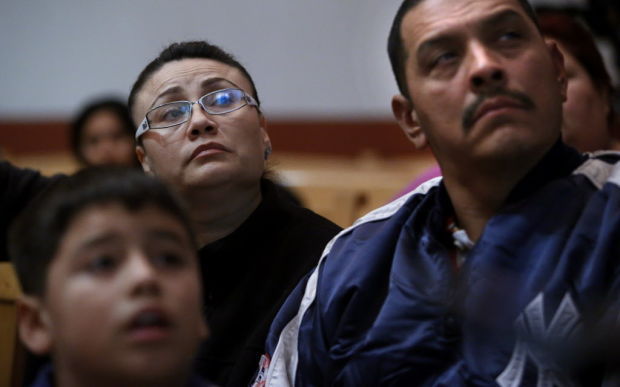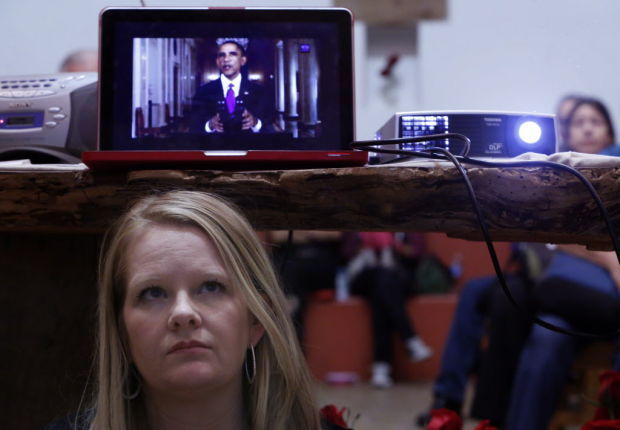President Obama’s announcement Thursday that he would use executive power to suspend the threat of deportation for millions in the country illegally was bittersweet for the two immigrants in sanctuary at Tucson churches — each now faces a very different future in their bids to stay in the country.
At Southside Presbyterian Church, Rosa Robles Loreto listened nervously as her lawyer translated the president’s address. She has been in sanctuary since Aug. 7, with a deportation order hanging over her head.
Across town, at St. Francis in the Foothills United Methodist Church, the mood was celebratory. Francisco Perez Cordova would most likely benefit from the president’s action and would soon be able to end his almost two-month stay inside the church.
The difference between Rosa and Francisco is not initially apparent.
Both have been in the country for more than 15 years with no criminal record. Both were detained by the Border Patrol after minor brushes with local law enforcement. Both ended up with deportation orders due to legal misrepresentation.
But Francisco is the father of five U.S.-born children, while Rosa’s two boys were born in Mexico. She found no reprieve in the president’s words.
Among other measures, Obama announced that parents of U.S.-citizen or permanent-resident children may apply for temporary relief from deportation and for work permits. That’s nearly 100,000 people in Arizona, the Migration Policy Institute estimates.
“The most tragic part of that is that Rosa very purposefully, very intentionally, chose not to have her babies here so as not to offend those that would call them ‘anchor babies,’ and so in many ways she did the right thing and now will be punished,” said St. Francis pastor John Wiltbank. “That’s exactly the type of technicality that ought to be fixed in a situation like this.”
At St. Francis, Francisco said he felt happy that his life was about to change, but that he wished the president would do something for all immigrants.
“Maybe I had never paid attention before this, but ever since I came here I realized there are many families that need help,” he said. “I’m glad I’m included, but I hoped there would be more.”
Although Rosa said she was sad that she wasn’t going to be able to go home, it was what the president didn’t say on Thursday that keeps her hopes up for her children.
“They’re what we’re here fighting for,” she said, “for their dreams.”
Obama is expected to officially announce today that he is also expanding the Deferred Action for Childhood Arrivals program.
Under the program, people brought by their parents when they were young and who meet other requirements can apply for a renewable work permit and not worry about being deported. About 32,000 were immediately eligible in Arizona, the Washington, D.C.-based Migration Policy Institute estimated.
The current age cap will be removed, and the program will be extended to people who arrived before Jan. 1, 2010, potentially benefiting another 40,000 in the state.
Since it was implemented in August 2012, about 21,000 applications from Arizona have been approved; another 4,000 have been accepted as of the end of June.
Waiting for reform
The number of people living in the country illegally has been decreasing, in part because the share of Mexicans — who still make up the largest group — is down.
But even after the president’s executive action, Rosa is part of the more than six million immigrants in the country illegally who will continue to hope Congress passes comprehensive immigration reform.
In Arizona, the unauthorized population is estimated to be between 274,000 and 300,000, down from half a million more than a decade ago. The vast majority, 84 percent, are from Mexico, the Pew Hispanic Center calculates.
About 4 percent of the state’s population is in the country without legal status. Still, Arizona is one of the top five states with the largest share of students in K-12 with at least one undocumented parent, at 11 percent.
In the summer of 2013, the Senate passed a sweeping bipartisan immigration reform bill that offered a path to permanent legal status to many of those in the country illegally, allocated billions to beef up border security, including nearly doubling the size of the Border Patrol, and changed the nation’s legal immigration system to allow more workers to enter the country.
But the measure was never voted on by the GOP-led House, whose leadership insisted in taking a piecemeal approach as opposed to taking up a comprehensive bill.
Sarai Milla, Francisco’s wife and a Deferred Action for Childhood Arrivals beneficiary, said Obama’s actions were a good start, but there was more to be done.
“The president should have done more than what he’s doing now. He’s putting a band-aid on a large wound,” she said. “But Congress has to do something, because they’re supposed to work for the people.”
Reason for optimism
Tucson attorney Margo Cowan, who represents both Rosa and Francisco, said the president’s action may be an imperfect beginning, but that there was no turning back on immigration reform.
“We’ve already won, and we have to have a sense of that victory. We have to have a sense of the moment,” Cowan said. “This is a tremendous, historic moment.”
Southside Presbyterian pastor Alison Harrington was also optimistic.
“The door has been opened for Rosa. We just don’t know exactly how to get through that door yet, because it’s a very complicated process,” she said. “But we know that she’s going to walk out of this door very soon, back to her family.”





